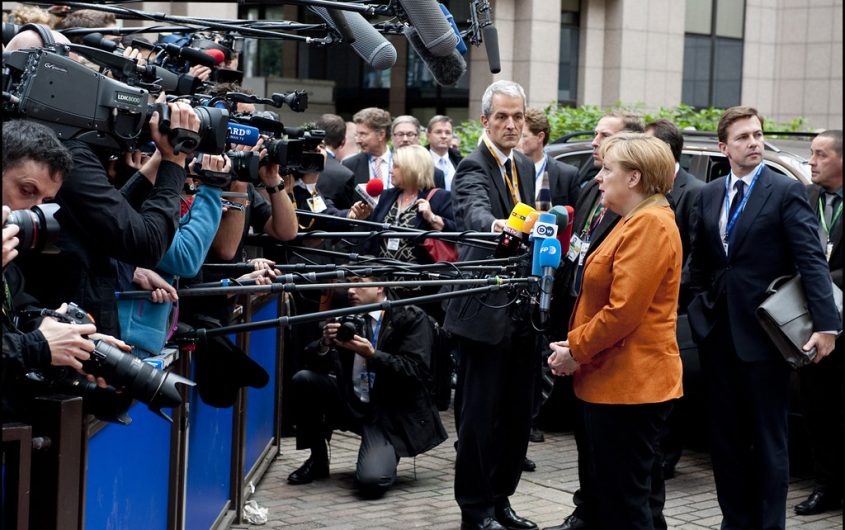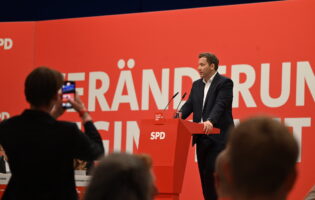
European Union 2012 - European Parliament via Flickr
Like Sands Through an Hourglass, So Are Angela Merkel’s Approval Ratings

Noah Porter
Research Intern
Noah Solomon Porter is a research intern at AICGS for two weeks during Summer 2020. He assists fellows with research and writing and helps organize and document events.
Noah is two years away from graduating from the European School Rhein Main in Frankfurt am Main, Germany. He is focusing his studies on the fields of Economics, International Relations, Physics and History.
Noah was born to an American family in Frankfurt where he has lived ever since. He learned intermediate Hebrew and French during his years at the I.E Lichtigfeldschule and is of native fluency in German and English.
German chancellor Angela Merkel may be cementing her legacy in the pandemic as the most popular leader in the history of the Bundesrepublik. While Donald Trump, Boris Johnson, Emmanuel Macron, and Shinzo Abe have all seen a decline in their approval ratings during the COVID-19 pandemic, the German chancellor has surged to unprecedented heights in popularity.
As Merkel approaches her final year in office, it is an opportune time to assess the vicissitudes of her approval ratings as we begin to consider her legacy in leadership. From the heights of the early “Merkel effect” and the current pandemic to the lows of the European debt and refugee crises, the German chancellor’s perseverance and leadership have left some commentators to deem her the “leader of the free world.”
Early Years in Office
After an extraordinarily tight victory, Merkel began her tenure in 2005 in an unexpected coalition with the Social Democrats. The ensuing months became known as the period of the “Merkel effect;” business confidence grew, unemployment began to fall, Germany’s economy rebounded, Merkel repaired Germany’s relationship with the United States after disagreements concerning the war in Iraq, and, for the first time since the Second World War, Germans more openly displayed a type of “patriotism” in conjunction with hosting the 2006 soccer World Cup. The German population seemed to have a large collective smile on its face, driving Merkel’s approval ratings up to 80 percent in early polls after the election, the highest of any chancellor in Germany’s history.
Early popularity was short-lived. By August 2006, only one in five people was happy with the coalition, and the chancellor’s approval rating plummeted to 47 percent by that November. This dramatic drop can be attributed to the controversial reform of Germany’s health care system. There were significant disagreements over how to finance the system; the reforms were heavily criticized by unions and consumer groups, and once reform measures were finally passed, opponents harshly criticized the pace at which they were to be put in place.
Navigating the Financial Crises
With health care reform challenges resolved, Chancellor Merkel’s popularity rode a wave of economic expansion in the world economy in 2007 that saw her return to a high of 77 percent approval by November of the same year.
The 2008 financial crisis ultimately proved a bombshell for many world leaders’ approval ratings. Merkel, on the other hand, maintained approval ratings of around 70 percent between 2008 and 2009. How did she maintain popularity while the global economy was crumbling? Facing stabilization and recovery challenges, Merkel embarked on a series of policy decisions that differentiated her from many of her peers, including stimulus spending and government-subsidized measures to combat unemployment rates. Her policy advocacy, coupled with pre-existing structural factors, offered Merkel’s approval ratings some buffer from the crisis effects.
The next financial crisis, however, was right around the corner and would prove more detrimental to the chancellor’s ratings. Cobbling together a controversial $185 billion rescue package to address the Eurozone’s debt crisis in the early stages of her second term plummeted her approval ratings to a mere 41 percent – the lowest she would encounter to date. The stabilization measures proved extremely unpopular among the populace with about half of the country expecting them to negatively impact their financial situation.
The chancellor’s approval ratings would barely rise above 50 percent until the end of 2011. Beginning in 2012, in light of a very stable economy and record low unemployment, she saw a resurgence in popularity. The public’s opinion of how she handled the Eurozone crisis even started to improve in the aftermath of the crisis, with 61 percent of Germans said that she had taken “correct and decisive action.” She experienced a record electoral victory in 2013 and her ratings continued to steadily rise until she hit 75 percent in 2015.
Controversial Refugee Policies
What came next was arguably the most controversial of the challenges she faced – the ongoing refugee crisis. During the height of the crisis in 2015 and 2016, Merkel argued that Germany had the moral duty and economic strength to cope with the influx of migrants. Her famous “Wir schaffen das” (“We can do it”) speeches drew substantial criticism from an electorate concerned by the ramifications of an open-border policy. This approach would weigh on her ratings for the following years as the crisis festered.
During 2017 her numbers fluctuated until the CDU/CSU scored a disappointingly low 33 percent in the federal election. Disappointing election results and a tedious path to coalition-forming negatively impacted the chancellor’s popularity and by the beginning of 2018, Deutschlandtrend reported that 46 percent even opposed a fourth term.
By 2018 the protracted refugee crisis was again a subject of domestic debate and poor regional election results for the CDU saw her approval ratings hit their second-lowest trough of 44 percent. By October 2018 she had ceded her role as CDU party leader. Nevertheless, soon the acuteness of the refugee crisis abated and the tailwinds of economic expansion and low employment helped to reestablish Merkel as Germany’s most popular politician in 2019, with 58 percent of Germans stating she was the reason why things were going well economically.
Cementing a Legacy in the Pandemic?
In the current and ongoing COVID-19 pandemic, Germany has done exceptionally well regarding testing, containment, and deployment of medical personnel. Perceived as having demonstrated critical leadership and astute policy choices through the pandemic, a recent poll shows that the chancellor has broken her all-time high, with 86 percent of Germans being satisfied with her as the head of government. Given a tenure that has faced an almost constant stream of crises over the last fifteen years, solidifying her exceptional legacy through crisis leadership and a perception of high global esteem seems extremely fitting. As we approach her final year in office, this may just ensure her long and successful tenure concludes on a high note, with such strong approval ratings at home.









